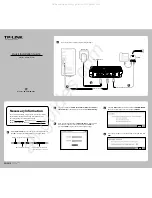
CHAPTER 13: RAPID SPANNING TREE PROTOCOL
RAPID SPANNING TREE PROTOCOL
MULTILINK ML2400 ETHERNET COMMUNICATIONS SWITCH – INSTRUCTION MANUAL
13–3
1.
Under some circumstances, it is possible for the rapid state transitions
employed by RSTP to result in an increase in the rates of frame duplication
and the order in which the frames are sent and received. To allow RSTP
switches to support applications and protocols that may be sensitive to frame
duplication and out of sequence frames, RSTP may have to be explicitly set to
be compatible with STP. This requires setting the “Force Protocol Version”
parameter to be STP compatible. This parameter should be set to all ports on
a given switch.
2.
As indicated above, one of the benefits of RSTP is the implementation of a
larger range of port path costs that accommodates higher network speeds.
New default values have been implemented for path costs associated with
the different network speeds. This may create incompatibility between
devices running the older implementations of STP a switch running RSTP.
3.
At any given time, the software can support either STP or RSTP but not both.
















































